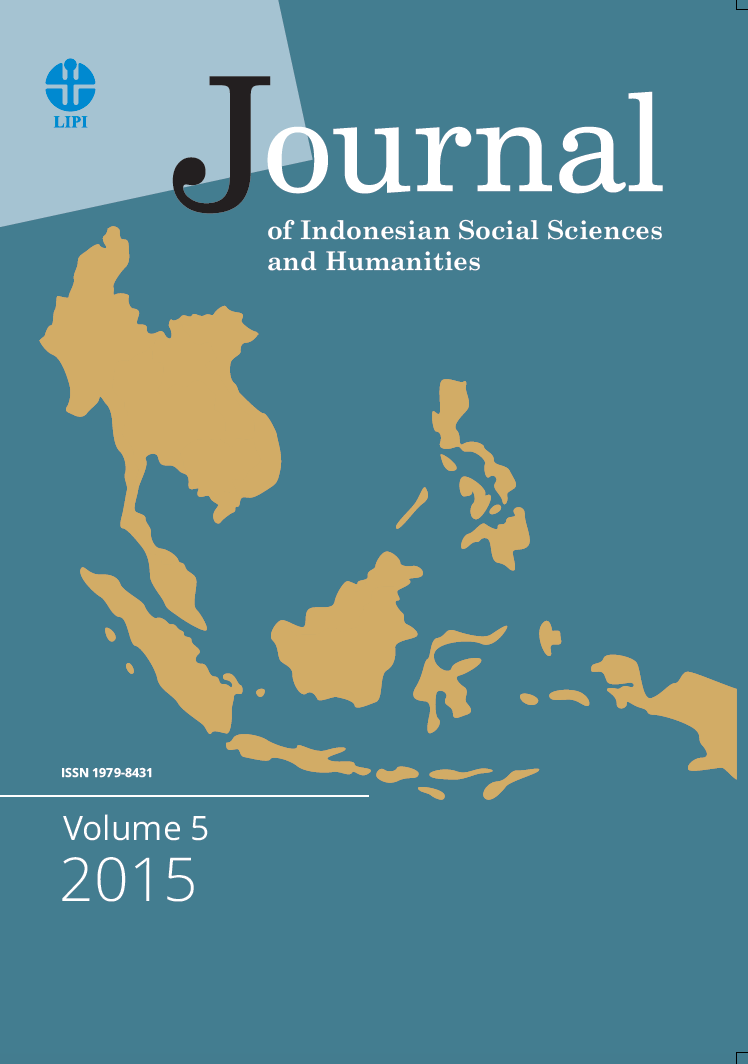Exploring The European Union Renewable Energy Directive and Its Implications for Indonesia’s Palm Oil Industry
Keywords:
Renewable Energy Directive (RED), palm oil, European Union, IndonesiaAbstract
The Renewable Energy Directive (RED) is a vehicle for environmental NGOs concerned about biodiversity destruction in Indonesia, for European biodiesel producers to admit new competitors, and for European Union (EU) interests to build a secure and sustainable economy for their region. In other words, it is a manifestation of the different interests of many agencies that share grace and favour over palm oil development in the EU. By observing the RED as the vehicle and the EU system of governance as its course, this paper records the interactions between those agencies in shaping the policy. The observations allow for agencies contributions to the images of palm oil. It depicts that biodiversity destruction is the basis for the sustainability criteria in the RED but it was not the only cause of the slowing down in the pace of the Indonesian palm oil market penetration in the region. To some extent, the RED is considered a trade barrier for Indonesian palm oil. However, the RED is an incentive to strengthen the image of the palm oil industry in a more constructive way and ensure the longevity of the industry.
References
“answer given by Mr De Gucht on behalf of the (European Parliament) Commission”, Parliamentary Questions, August 26, 2013. [online] http://www.europarl.europa.eu/sides/getAllAnswers.do?reference=E-2013-008455&language=EN
“MP Baloha proposes banning palm oil in food production.” Kyivpost, March 14, 2013. [online] http://www.kyivpost.com/content/ukraine/mp-baloha-proposes-banning-palm-oil-in-food-production-321695.html
“The campaign against palm oil: the other oil spill”. The Economist, June 24, 2010 [online] http://www.economist.com/node/16423833
Amri, Qayyum. (2014). ‘Sawit minyak nabati paling sustainable’. Sawit Indonesia, III(33).
Asia palm oil magazine. (2013). ‘French senate passes Nutella tax’. Asia palm oil magazine, 1(4). [online] http://www.asiapalmoilmag. com/PALMAG%20Jan-Mar%202013.pdf
Commission for the European Community. (1997). Energy for the future: renewable sources of energy. White Paper for a community and strategy and action plan [online] http://europa.eu/documents/comm/white_papers/pdf/com97_599_en.pdf
Commission of the European Community. (1993). Growth, competitiveness, employment: the challenges and ways forward into the 21st century. White Paper. [online] http://aei.pitt.edu/1139/1/growth_wp_COM_93_700_Parts_A_B.pdf
Commission of the European Community. (1996). Energy for the future: renewable sources of energy. Green Paper for community strategy. [online] http://aei.pitt.edu/1280/1/renewalbe_energy_gp_COM_96_576.pdf
Commission of the European Community. (2006a). Commission staff working document. Summary report on the analysis of the debate on the Green Paper: a European strategy for sustainable, competitiveness and secure energy. [online] http://ec.europa.eu/energy/strategies/consultations/doc/2009_09_24/2006_11_16_ sec_1500.pdf
Commission of the European Community. (2006b). Green Paper. European strategy for sustainable, competitive and secure energy. [online] http://europa.eu/documents/comm/green_papers/pdf/com2006_105_en.pdf
Commission of the European Community. (2007). Renewable energy roadmap. Renewable energies in the 21st century: building a more sustainable future. [online] http://eur-lex.europa.eu/legal-content/EN/TXT/PDF/?uri=CELEX: 52006DC0848&from=EN
Commission of the European Union. (2005). Biomass action plan. [online] http://ec.europa.eu/energy/res/biomass_action_plan/doc/2005_12_07_comm_biomass_action_plan_en.pdf
Commission of the European Union. (2006). An EU strategy for biofuels. [online] http://ec.europa.eu/energy/res/biomass_action_plan/doc/2006_02_08_comm_eu_strategy_en.pdf
Commission of the European Union. (2007). Biofuel progress report [online] http://eur-lex.europa.eu/legal-content/EN/TXT/PDF/?uri=CELEX:52006DC0845&from=EN
European Commission. (2007). Public consultation biofuel issues in the new legislation on the promotion of renewable energy. [online] http://ec.europa.eu/energy/renewables/consultations/2007_06_18_biofuels_en.htm
European Commission. (2008). Public consultation: preparation of a report on requirements for a sustainability scheme for energy uses of biomass. [online] http://ec.europa.eu/energy/renewables/consultations/2008_09_30_biomass_en.htm
European Parliament. (2008). Draft European parliament legislative resolution. [online] http://www.europarl.europa.eu/sides/getDoc.do?type=REPORT&reference=A6-2008-0369&language=EN
Geramsimchuk, Ivetta & Peng Yam Koh. (2013). The EU biofuel policy and palm oil: cutting subsidies or cutting rainforest. The International institute for Sustainable Development
Greenpeace. (2008). Unilever ‘monkey business’, Green peace swing into action. [online] http://www.greenpeace.org/usa/en/news-and-blogs/news/unilever-s-monkey-business/
Hanim, Adnan. (2014). Another palm oil drive. [online] http://www.thestar.com.my/Business/Business-News/2014/06/07/Another-anti-palm-oil-drive-French-politicians-calling-for-new-taxes-on-food-and-beverages-deemed-dan/?style=biz
Lin, Jolene. (2010). The sustainability of biofuels: limit of the meta-standard approach. The Governance of Clean Development Working Paper Series 011 [online] http://www.tyndall.ac.uk/sites/default/files/GCD_WorkingPaper011.pdf
Nelsen, Arthur. “Indonesian palm oil faces EU bar over tax loophole.” Euractiv, July 26, 2013. [online] http://www.euractiv.com/development-policy/indonesian-palm-oil-faces-eu-bar-news-529579.
Official Journal of the European Communities. (2001). Directive 2001/77/EC on the promotion of electricity produced from renewable energy resource in the internal electricity market. [online] http://eur-lex.europa.eu/legal-content/EN/TXT/PDF/?uri= CELEX:32001L0077&from=EN
Official Journal of the European Union. (2003). Directive 2003/30/EC of the promotion of the use of biofuels or other renewable fuels in transportation sector. [online] http://ec.europa.eu/energy/res/legislation/doc/biofuels/en_final.pdf
Piermartini, Roberta and ERSD. (2004). The role of export taxes in field of primary commodities. Geneva: World Trade Organization p: 7–15.
Potter, David. (1996). NGOs and environmental policies Asia Africa. London: Frank Cass.
Sennekamp, Peter. (2012). “Eu met its 2010 renewable electricity target--ambitious 2030 target needed.” Euractive Press Release, January 12, 2012. [online] http://pr.euractiv.com/pr/info-eu-met-its-2010-renewable-electricity-target-ambitious-2030-target-needed-91929
Unilever. (2008). Unilever palm oil video. [online] http://www.unilever.com/sustainable-living-2014/news-and-resources/sustainable-living-news/unileverpalmoilvideo.aspx
Yulisman, Linda. (2014). RI proposes trade platform for CPO exports. [online] http://www.thejakartapost.com/news/2014/03/21/ri-proposes-trade-platform-cpo-exports.html
Interview with Rutha Balthause (2012), representative of EU DG energy in charge in international cooperation and social sustainability.
Interview with Havas Ogrosuseno (2014), the Indonesian Ambassador for Belgium, the regulation has caused a financial burden for Indonesia.
Interview with Sawit Watch and Oxfam Novib Indonesia (2012).
Downloads
Published
Issue
Section
License
Copyright (c) 2015 Bondan Widyatmoko

This work is licensed under a Creative Commons Attribution-ShareAlike 4.0 International License.
Authors who publish with this journal agree to the following terms:
1. Authors retain copyright and grant the journal right of first publication with the work simultaneously licensed under an Attribution-ShareAlike 4.0 International (CC BY-SA 4.0) license. This license allows others to remix, adapt, and build upon the work, as long as they credit the author and license their new creations under the same terms.
2. Authors may enter into separate, additional contractual arrangements for the non-exclusive distribution of the journal’s published version of the work (e.g., posting it to an institutional repository or including it in a book), provided there is an acknowledgment of its initial publication in this journal.
3. Authors are permitted and encouraged to post their work online (e.g., in institutional repositories or on their personal website) prior to and during the submission process, as this can lead to productive exchanges and increase citations of the published work (See The Effect of Open Access ).


















